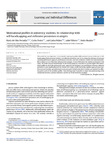Motivational profiles in university students. Its relationship with self-handicapping and defensive pessimism strategies

Non accesible ata 9999-99-99
Ver/
Use este enlace para citar
http://hdl.handle.net/2183/35007Coleccións
- Investigación (FEDU) [938]
Metadatos
Mostrar o rexistro completo do ítemTítulo
Motivational profiles in university students. Its relationship with self-handicapping and defensive pessimism strategiesData
2017-05Cita bibliográfica
Ferradás, M.M., Freire, C., Núñez, J. C., Pineiro, I., & Rosário, P. (2017). Motivational profiles in university students. Its relationship with self-handicapping and defensive pessimism strategies. Learning and Individual Differences, 56, 128-135. DOI: 10.1016/j.lindif.2016.10.018
Referenciado por
Xing, H., Yao, M., Zhu, W. et al. The role of perceived parent social comparisons in adolescent academic social comparison, self-efficacy, and self-handicapping: A person-centered approach. Current Psychology, 42, 15600–15615 (2023). https://doi.org/10.1007/s12144-022-02850-4
Resumo
[Abstract] This article has two objectives: (a) to identify multi-goal profiles differentiated in terms of the use of self-handicapping (behavioral and claimed) and defensive pessimism and (b) to analyze the relevance of each goal (learning, performance-approach, performance-avoidance, and work-avoidance) within each motivational profile to explain the use of the three self-protective strategies. A total of 940 university students participated in the study. The results indicate that both types of self-handicapping are associated to a greater degree with motivational profiles in which the performance goals (approach and avoidance) are predominant. However, defensive pessimism is used significantly more by students who adopt a profile that brings together approach goals (performance and learning) and performance-avoidance goals. Similarly, the three strategies are explained by different goals in each of the identified profiles. These findings make it possible to deepen the understanding of the relationship between academic motivation and the use of self-protection strategies.
Palabras chave
Multi-goal profiles
Behavioral self-handicapping
Claimed self-handicapping
Defensive pessimism
University students
Behavioral self-handicapping
Claimed self-handicapping
Defensive pessimism
University students
Versión do editor
Dereitos
©2016Elsevier Inc.All rights reserved.
ISSN
1041-6080





